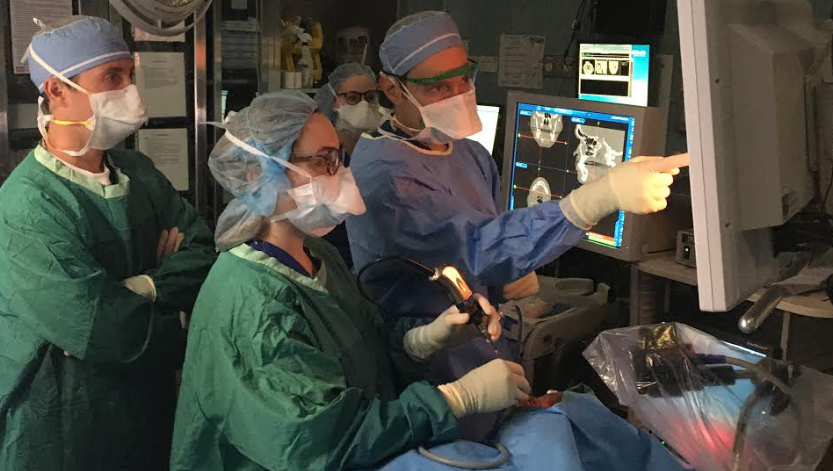Ways ENT Clinics Provide Full-Spectrum Allergy and Sinus Care
Wiki Article
Exploring the Field of Otolaryngology: What to Anticipate When You Speak With an ENT
Otolaryngology, generally described as ENT, incorporates the diagnosis and treatment of ear, nose, and throat problems. For those experiencing relevant problems, consulting an ENT professional can supply quality and alleviation. Understanding what to expect during such assessments is vital for efficient interaction and care. This introduction will certainly outline vital aspects of the ENT experience, consisting of typical reasons for sees and the procedures involved in medical diagnosis and therapy.
Recognizing Otolaryngology: An Introduction
Otolaryngology, often referred to as ENT (Throat, nose, and ear) medication, is a customized branch of medicine that concentrates on the diagnosis and therapy of problems impacting these critical areas of the body. This field incorporates a variety of conditions, including those associated to hearing, equilibrium, respiratory system function, and speech. Otolaryngologists are educated to manage both clinical and surgical therapies, using advanced methods and modern technologies. Their expertise expands past traditional conditions, addressing concerns such as allergies, sinus infections, and hearing loss. Additionally, they play an important duty in the administration of head and neck cancers, supplying complete care tailored to specific client needs. Overall, otolaryngology remains crucial for maintaining health and lifestyle in damaged people.Usual Reasons to See an ENT Specialist
Several individuals seek the know-how of an ENT professional for a range of factors, mirroring the diverse nature of problems that impact the nose, throat, and ear. Typical problems consist of persistent sinus problems, which often leads to consistent nasal congestion and facial pain. Allergic reactions and their connected signs, such as sneezing and itching, also trigger brows through to these professionals (Hearing). Hearing loss, whether sudden or gradual, is another significant reason for examination. Furthermore, people may look for assessment for throat conditions, consisting of relentless hoarseness or swallowing difficulties. Sleep apnea, defined by interrupted breathing during sleep, is often dealt with by ENT professionals also. Each of these problems highlights the value of specialized care in managing complicated ENT-related wellness issues
Preparing for Your ENT Appointment
When preparing for an ENT appointment, it is essential to gather relevant details and think about any kind of details issues. Individuals should compile a thorough case history, including previous ear, nose, or throat concerns, surgeries, and present medicines. Documenting symptoms-- such as duration, extent, and regularity-- can supply valuable insights for the ENT expert. In addition, individuals ought to prepare a listing of concerns they wish to ask, making sure that all problems are addressed throughout the see. Bringing along any type of relevant clinical documents or examination results can further assist the ENT in recognizing the patient's condition. Finally, people ought to validate their consultation information, consisting of day, time, and place, to reduce any type of last-minute complication. Correct preparation can enhance the effectiveness of the consultation and lead to far better results.What to Expect During the Examination
As the assessment begins, the person can anticipate to engage in a comprehensive discussion with the ENT professional regarding their signs and clinical background. The specialist will ask regarding the duration, regularity, and intensity of symptoms such as hearing loss, nasal blockage, or aching throat. In addition, the client's previous clinical problems, drugs, and any kind of pertinent family members background will be reviewed, aiding the specialist in forming a complete understanding of the individual's health. The ENT may also inquire about way of life variables, such as direct exposure to allergens or irritants. This open dialogue develops a structure for the examination, guaranteeing that the person's problems are addressed and setting the stage for any required evaluations or recommendations for treatment.
Analysis Tests and Treatments in Otolaryngology
A series of diagnostic tests and treatments are essential in otolaryngology to properly review and diagnose problems affecting the throat, nose, and ear. Common tests consist of audiometry, which measures hearing feature, and tympanometry, assessing middle ear pressure. Nasal endoscopy enables visualization of the nasal flows and sinuses, while laryngoscopy checks out the throat and singing cords. Imaging techniques, such as CT scans and MRIs, give thorough views of head and neck structures. Allergic reaction screening may additionally be carried out to identify triggers for sinus or breathing problems. These diagnostic tools allow ENT experts to establish an extensive understanding of people' problems, ensuring tailored and efficient monitoring strategies. Proper diagnosis is crucial for effective treatment results in otolaryngology.Treatment Alternatives Provided by ENT Specialists
ENT specialists provide a variety of therapy options tailored to address details problems influencing the nose, throat, and ear. These treatments range from conservative methods, such as medication and lifestyle adjustments, to more invasive procedures. Allergic reactions might be taken care of with antihistamines or immunotherapy, while persistent sinus problems may need nasal corticosteroids or sinus surgery. For hearing loss, ENT specialists commonly recommend listening device or surgical interventions like cochlear implants. In cases of throat disorders, choices can include speech treatment or procedures to remove blockages. Furthermore, they may provide advice for handling sleep apnea, including using CPAP tools or surgical treatments. Generally, the goal is to improve people' lifestyle with individualized care and reliable therapy methods.When to Seek Follow-Up Treatment With an ENT
When to seek follow-up care with an ENT specialist is crucial for handling ongoing signs or problems associated to ear, nose, and throat conditions, identifying. People ought to take into consideration arranging a follow-up visit if signs and symptoms persist in spite of first treatment, such as chronic ear pain, nasal congestion, or throat discomfort. Adjustments in hearing, equilibrium issues, or uncommon nasal discharge might also necessitate further assessment. Furthermore, if a patient experiences side impacts from prescribed medicines or has actually undergone a surgery, follow-up treatment is essential to keep an eye on healing and attend to any type of issues. Timely appointments can ensure effective administration of problems, prevent possible problems, and provide tranquility of mind pertaining to one's wellness. Seeking follow-up care promotes aggressive health and wellness monitoring in otolaryngology.Frequently Asked Inquiries

What Certifications Should I Search for in an ENT Specialist?
When looking for an ENT professional, one ought to look for board qualification, pertinent experience, and strong individual evaluations. Additionally, reliable communication skills and a thoughtful technique can significantly improve the general treatment experience.Just how Do I Choose the Right ENT for My Requirements?
Selecting the best ENT expert entails examining their credentials, experience, and client reviews (Voice). It is necessary to consider their communication design and method to therapy, ensuring they straighten with the individual's details health and wellness needs and choicesAre There Any Type Of Risks Connected With ENT Procedures?
The risks connected with ENT treatments might include infection, blood loss, anesthesia difficulties, and potential damages to bordering frameworks. Clients ought to discuss these risks with their physician to recognize private issues and warranty educated decisions.Exactly How Can I Manage Stress And Anxiety Prior To My ENT Visit?
To take care of stress and anxiety prior to a consultation, people can exercise Otolaryngology deep breathing workouts, visualize positive end results, prepare concerns ahead of time, and look for support from pals or household, cultivating a feeling of confidence and calmness.What Should I Do if I Experience Negative Effects From Treatment?
The person should immediately report them to their health care copyright if side impacts from therapy occur. Modifications to therapy or extra interventions may be needed to assure security and performance in managing their condition - ENT. As the appointment starts, the patient can anticipate to involve in a comprehensive conversation with the ENT specialist about their symptoms and medical history. These diagnostic devices allow ENT professionals to develop an extensive understanding of patients' problems, guaranteeing tailored and reliable management plans. ENT professionals offer a variety of treatment options tailored to address specific conditions affecting the nose, throat, and ear. When seeking an ENT professional, one must look for board accreditation, relevant experience, and solid individual testimonials. Selecting the best ENT expert involves reviewing their credentials, experience, and client reviewsReport this wiki page